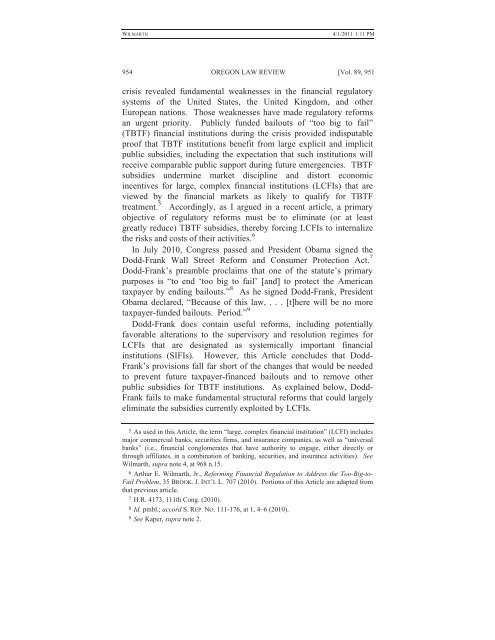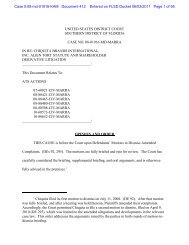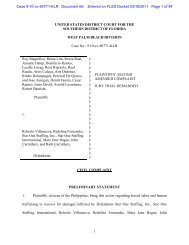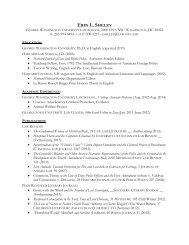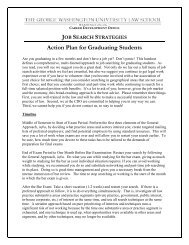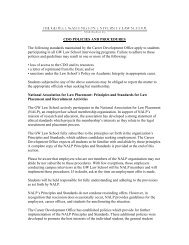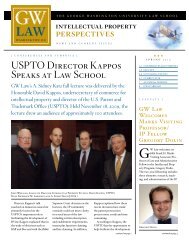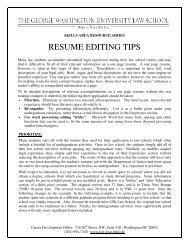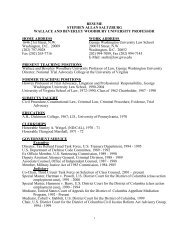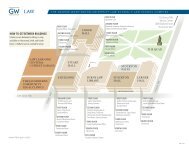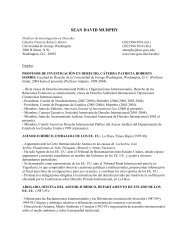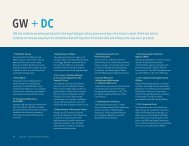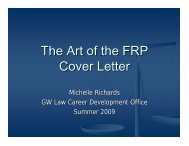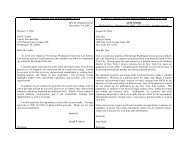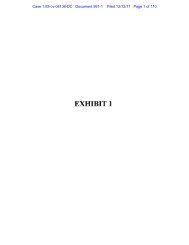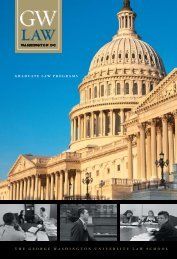CLE Materials for Panel #1 - George Washington University Law ...
CLE Materials for Panel #1 - George Washington University Law ...
CLE Materials for Panel #1 - George Washington University Law ...
Create successful ePaper yourself
Turn your PDF publications into a flip-book with our unique Google optimized e-Paper software.
WILMARTH<br />
4/1/2011 1:11 PM<br />
954 OREGON LAW REVIEW [Vol. 89, 951<br />
crisis revealed fundamental weaknesses in the financial regulatory<br />
systems of the United States, the United Kingdom, and other<br />
European nations. Those weaknesses have made regulatory re<strong>for</strong>ms<br />
an urgent priority. Publicly funded bailouts of “too big to fail”<br />
(TBTF) financial institutions during the crisis provided indisputable<br />
proof that TBTF institutions benefit from large explicit and implicit<br />
public subsidies, including the expectation that such institutions will<br />
receive comparable public support during future emergencies. TBTF<br />
subsidies undermine market discipline and distort economic<br />
incentives <strong>for</strong> large, complex financial institutions (LCFIs) that are<br />
viewed by the financial markets as likely to qualify <strong>for</strong> TBTF<br />
treatment. 5 Accordingly, as I argued in a recent article, a primary<br />
objective of regulatory re<strong>for</strong>ms must be to eliminate (or at least<br />
greatly reduce) TBTF subsidies, thereby <strong>for</strong>cing LCFIs to internalize<br />
the risks and costs of their activities. 6<br />
In July 2010, Congress passed and President Obama signed the<br />
Dodd-Frank Wall Street Re<strong>for</strong>m and Consumer Protection Act. 7<br />
Dodd-Frank’s preamble proclaims that one of the statute’s primary<br />
purposes is “to end ‘too big to fail’ [and] to protect the American<br />
taxpayer by ending bailouts.” 8 As he signed Dodd-Frank, President<br />
Obama declared, “Because of this law, . . . [t]here will be no more<br />
taxpayer-funded bailouts. Period.” 9<br />
Dodd-Frank does contain useful re<strong>for</strong>ms, including potentially<br />
favorable alterations to the supervisory and resolution regimes <strong>for</strong><br />
LCFIs that are designated as systemically important financial<br />
institutions (SIFIs). However, this Article concludes that Dodd-<br />
Frank’s provisions fall far short of the changes that would be needed<br />
to prevent future taxpayer-financed bailouts and to remove other<br />
public subsidies <strong>for</strong> TBTF institutions. As explained below, Dodd-<br />
Frank fails to make fundamental structural re<strong>for</strong>ms that could largely<br />
eliminate the subsidies currently exploited by LCFIs.<br />
5 As used in this Article, the term “large, complex financial institution” (LCFI) includes<br />
major commercial banks, securities firms, and insurance companies, as well as “universal<br />
banks” (i.e., financial conglomerates that have authority to engage, either directly or<br />
through affiliates, in a combination of banking, securities, and insurance activities). See<br />
Wilmarth, supra note 4, at 968 n.15.<br />
6 Arthur E. Wilmarth, Jr., Re<strong>for</strong>ming Financial Regulation to Address the Too-Big-to-<br />
Fail Problem, 35 BROOK.J.INT’L L. 707 (2010). Portions of this Article are adapted from<br />
that previous article.<br />
7 H.R. 4173, 111th Cong. (2010).<br />
8 Id. pmbl.; accord S. REP.NO. 111-176, at 1, 4–6 (2010).<br />
9 See Kaper, supra note 2.


